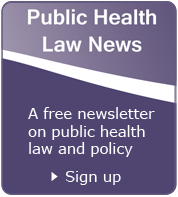Toolkits, Handbooks, and Menus
The Public Health Law Program (PHLP) has developed toolkits on a number of public health topics as resources for public health practitioners and their legal counsel. This page lists toolkits developed by PHLP and selected toolkits prepared by others.
Chronic Disease
-
Heart Disease and Stroke: Laws and Policies that Support the Reduction of Sodium in the Food Supply
The Public Health Law program collaborated with the Division for Heart Disease and Stroke Prevention in the National Center for Chronic Disease Prevention and Health promotion to develop a portfolio of resources on the use of law to reduce dietary sodium by states, localities, and territories.
Emergency Preparedness
- Selected Federal Legal Authorities Pertinent to Public Health Emergencies [PDF - 150KB] lists federal laws that address preparing for and responding to a range of natural and man-made disasters and emergencies. The list includes a brief description of the law and a citation.
- Criminal and Epidemiological Investigations Handbook [PDF-12.4MB]
Provides an overview of criminal and epidemiological investigation procedures involving interactions between law enforcement and public health. Law enforcement and public health officials should read the entire handbook to understand the different goals and needs of the other organization before an event occurs. This handbook will teach public health and law enforcement how to work together to identify the biological agent, prevent the spread of the disease, avoid public panic, and apprehend those responsible. - Older Adult Emergency Preparedness Web Portal
A web portal that serves as a one-stop source for further resources, tools, and information related to all-hazards preparedness for older adults. Focus areas include developing plans, collecting and using data, registries, training and competency, law-based solutions, caregiver preparedness, and sheltering older adults. - Social Distancing Law Assessment Template
As part of the Social Distancing Law Project, PHLP created a Social Distancing Law Assessment Template. It includes a standardized template for assessing legal authorities, a hypothetical scenario and instructions for conducting a Legal Consultation Meeting, and examples of completed documents from the state of Michigan and the Commonwealth of Virginia. - Court House Preparedness for Public Health Emergencies [PDF-852KB] (Univ. of Pittsburgh)
A case study demonstrating how Pennsylvania counties have conducted emergency planning that includes a planning template and planning resources.
Emerging and Zoonotic Disease Laws
-
Menu of State Turtle-Associated Salmonellosis Laws [PDF 1MB]
Turtles are often carriers of salmonella, which can cause serious salmonellosis infections in humans, particularly among vulnerable populations such as young children and the elderly. In recent years, salmonellosis outbreaks linked to pet turtles have increased throughout the United States. This menu addresses state and territorial laws regarding the sale of turtles, as well as other laws that limit turtle use and distribution.
Infectious Disease
- Legal Tools for Tuberculosis Control
CDC, in cooperation with the National Tuberculosis Controllers Association and other partners, has developed and facilitated development of a portfolio of law-related resources for use by states, tribes, and localities to prevent and control the spread of TB. - Menu of Selected Provisions in Healthcare-Associated Infection Laws [PDF - 2.33MB] is a resource that helps attorneys and public health practitioners understand the variety of provisions in state HAI laws. The Menu provides examples from state statutes related to the range of policy topics found in HAI laws. The Menu is a companion to the CDC-ASTHO Policy Toolkit, Eliminating HAI—State Policy Options, published by CDC and the Association for State and Territorial Health Officials in April 2011.
Prescription Drugs
The United States is experiencing an unprecedented epidemic of prescription drug overdose deaths. The primary responsibility to regulate and enforce prescription drug practices falls to the states. State laws are often used to prevent various injuries, with demonstrated benefits, yet little information exists about the effectiveness of state statutes or regulations designed to prevent prescription drug abuse and diversion. The following menus summarize some of the legal strategies states have used to address prescription drug misuse, abuse, and overdose. The Public Health Law Program created the menus in partnership with CDC’s National Center for Injury Prevention and Control.
- Menu of Prescription Drug Time and Dosage Limit Laws [PDF 373KB]
An inventory of time and dosage limit laws on the prescribing or dispensing of controlled substances. - Menu of Physical Examination Requirements [PDF 405KB]
An inventory of physical examination laws that expressly require a practitioner to examine or evaluate the patient before prescribing or dispensing controlled substances. - Menu of Doctor Shopping Laws [PDF 335KB]
An inventory of state legal strategies to help assess doctor shopping laws. Doctor shopping is when a patient visits multiple healthcare practitioners to obtain controlled substances without the prescribers’ knowledge of the other prescriptions. - Menu of Pain Management Clinic Regulation [PDF 235KB]
An inventory of state legal strategies to help assess pain management clinic laws - Menu of Tamper-Resistant Prescription Form Requirements [PDF 506KB]
An inventory of various state laws aimed at inhibiting diversion of prescription drugs by establishing requirements for tamper-resistant prescription forms - Menu of State Prescription Drug Identification Laws [PDF 323KB]
An inventory of various provisions in state prescription drug identification laws, including laws requiring patients to show personal identification to pharmacists before receiving prescription drugs - Menu of State Laws Related to Prescription Drug Overdose Emergencies [PDF 176KB]
An inventory of emergency laws that grant people who call 911 in response to an overdose emergency either immunity from prosecution or mitigation in prosecution or at sentencing
Disclaimer: Information available on this website that was not developed by the Centers for Disease Control and Prevention (CDC) does not necessarily represent any CDC policy, position, or endorsement of that information or of its sources. The information contained on this website is not legal advice; if you have questions about a specific law or its application you should consult your legal counsel.
- Page last reviewed: April 24, 2015
- Page last updated: April 24, 2015
- Content source:




 ShareCompartir
ShareCompartir



